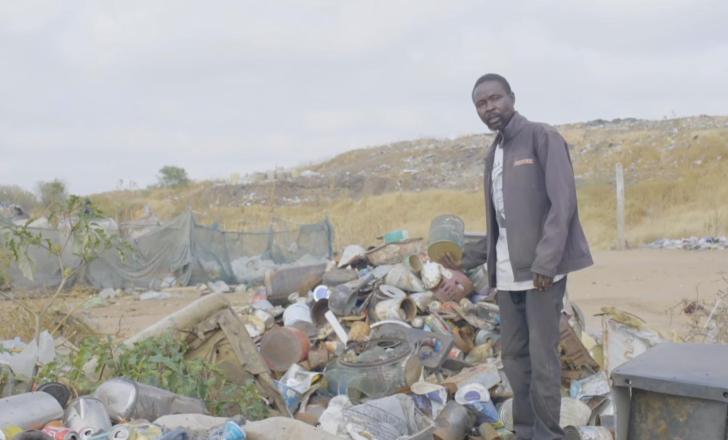News / Local
How Poverty Drives Innovation in Bulawayo's Ngozi Mine Landfill
13 Jul 2023 at 08:44hrs |
3 Views

Located in the outskirts of Bulawayo, the Ngozi Mine landfill is home to a resilient community that has learned to adapt and innovate in the face of extreme adversity.
Families there live in houses made from scraps of metal, plastic, and whatever materials they can find. Despite the challenges they face on a daily basis, the residents of the dump have managed to carve out ways of survival through their skills and resourcefulness.
Recycling has emerged as a means of survival, as residents collect and sell plastic, rubber, bones, and zinc for as little as 7 cents per kilogram. The community has also established leadership structures, with a chief and secretary organizing and coordinating efforts to improve their living conditions.
One of the most pressing challenges faced by the community is the lack of access to clean water and sanitation facilities. With no toilets available, open defecation is a daily reality for the residents. This not only poses health risks but also strips them of their dignity. Additionally, the absence of transportation services further isolates the community, making it difficult for them to access education, healthcare, and job opportunities.
Gender-based violence (GBV) is a pervasive issue in many impoverished communities, and the Ngozi Mine Rubbish Dump is no exception. However, the residents have come together to create safe spaces and support networks for survivors. NGOs have played a crucial role in providing counselling services, legal aid, and empowerment programs to combat GBV.
The prevalence of HIV/AIDS in the Ngozi Mine Rubbish Dump is alarmingly high, and access to antiretroviral (ARV) treatment is a matter of life and death for many. Recognizing the urgency of the situation, the private sector has partnered with healthcare providers to ensure that individuals living with HIV/AIDS receive the medication they need. This has not only improved the health outcomes of those affected but has also reduced the stigma surrounding the disease.
Food insecurity is a daily reality for the residents of the Ngozi Mine Rubbish Dump. Many families struggle to put even a single meal on the table. Charitable organizations have stepped in to provide food assistance, distributing food parcels to ensure that no one goes hungry.
The Ngozi Mine Rubbish Dump community is a testament to the human spirit's resilience and ability to overcome adversity. Despite living in extreme poverty, the residents have shown incredible innovation and resourcefulness in finding solutions to the challenges they face. Through their collective efforts and the support of private partners, they hope to gradually break free from the cycle of poverty and creating a brighter future for themselves and their children.
Families there live in houses made from scraps of metal, plastic, and whatever materials they can find. Despite the challenges they face on a daily basis, the residents of the dump have managed to carve out ways of survival through their skills and resourcefulness.
Recycling has emerged as a means of survival, as residents collect and sell plastic, rubber, bones, and zinc for as little as 7 cents per kilogram. The community has also established leadership structures, with a chief and secretary organizing and coordinating efforts to improve their living conditions.
One of the most pressing challenges faced by the community is the lack of access to clean water and sanitation facilities. With no toilets available, open defecation is a daily reality for the residents. This not only poses health risks but also strips them of their dignity. Additionally, the absence of transportation services further isolates the community, making it difficult for them to access education, healthcare, and job opportunities.
Gender-based violence (GBV) is a pervasive issue in many impoverished communities, and the Ngozi Mine Rubbish Dump is no exception. However, the residents have come together to create safe spaces and support networks for survivors. NGOs have played a crucial role in providing counselling services, legal aid, and empowerment programs to combat GBV.
The prevalence of HIV/AIDS in the Ngozi Mine Rubbish Dump is alarmingly high, and access to antiretroviral (ARV) treatment is a matter of life and death for many. Recognizing the urgency of the situation, the private sector has partnered with healthcare providers to ensure that individuals living with HIV/AIDS receive the medication they need. This has not only improved the health outcomes of those affected but has also reduced the stigma surrounding the disease.
Food insecurity is a daily reality for the residents of the Ngozi Mine Rubbish Dump. Many families struggle to put even a single meal on the table. Charitable organizations have stepped in to provide food assistance, distributing food parcels to ensure that no one goes hungry.
The Ngozi Mine Rubbish Dump community is a testament to the human spirit's resilience and ability to overcome adversity. Despite living in extreme poverty, the residents have shown incredible innovation and resourcefulness in finding solutions to the challenges they face. Through their collective efforts and the support of private partners, they hope to gradually break free from the cycle of poverty and creating a brighter future for themselves and their children.
Source - Byo24News
Join the discussion
Loading comments…































